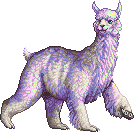Viewing TXDA3

Father: Unknown
Unknown Pedigree
Hardiness: 88
Appearance: 1
Emerged: 8:15 15.01.2025
Matured: 19:37 16.01.2025
Hardy and adaptable, the solitary Pieda Pastigo has developed a wide-ranging diet and efficient metabolism in order to survive in the cold desert climate it calls home. Tall grasses make up a large part of its year-round intake, along with a seasonal foraged diet of nuts, fruits, and roots that provide a sustaining source of protein. Thanks to its thick layer of fat and plush woollen coat, the Pieda Pastigo is able to stay healthy and warm throughout its hibernation during the unforgiving winter season. When lands thaw in the warmer months, it migrates to higher altitudes in search of new pastures and untouched vegetation. Although the Pieda Pastigo is relatively small in size, it is still able to reach the tallest berries and fruits in its windswept terrain by standing on its hind paws and extending its long neck. If threatened, it will similarly rear up onto two legs, spreading its forelimbs wide and loudly grunting and bellowing in order to increase its size and intimidate would-be predators.
The creatures that dwell in this rather desolate world still display some diversity in appearance, eating habits, and social behavior. Whether they have fur or feathers, skin or scales, their unique genetic makeup allows for a variety of colors and markings within each species. Despite limitations in food sources, herbivores, omnivores, and carnivores are all present in the food chain, and each species requires specialized care within a laboratory. Although the artificial setting of housing units and breeding pods precludes most opportunities to study true interspecific behavior, the interactions within and between species has been studied extensively in the wilderness by scientists daring enough to venture beyond the outpost’s walls.
